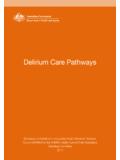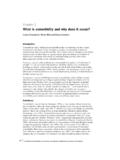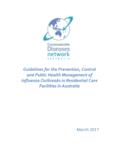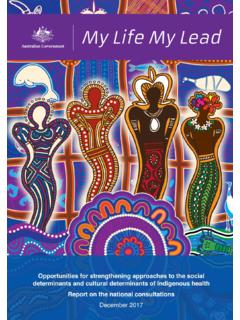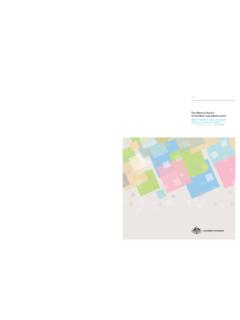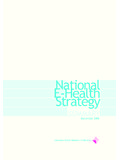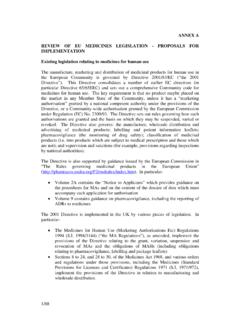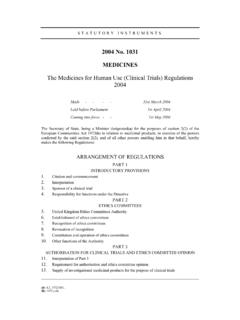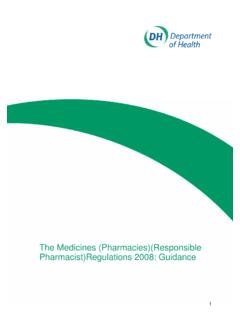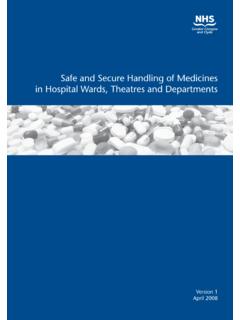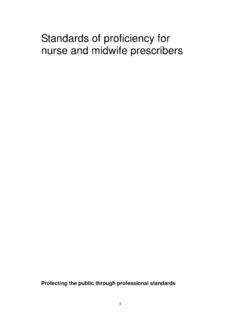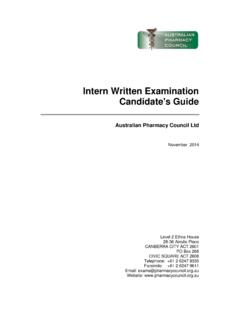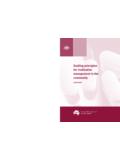Transcription of Guiding principles for medication management in ...
1 Guiding principles for medication management in residential aged care facilitiesOctober 2012 Guiding principles for medication management in residential aged care facilitiesOctober 2012 Guiding principles FOR medication management IN residential aged CARE FACILITIESG uiding principles for medication management in residential aged care facilitiesISBN: 978-1-74241-815-5 Online ISBN: 978-1-74241-816-2 Publications approval number: D0804 Copyright Statements:Paper-based publications Commonwealth of Australia 2012 This work is copyright. You may reproduce the whole or part of this work in unaltered form for your own personal use or, if you are part of an organisation, for internal use within your organisation, but only if you or your organisation do not use the reproduction for any commercial purpose and retain this copyright notice and all disclaimer notices as part of that reproduction.
2 Apart from rights to use as permitted by the Copyright Act 1968 or allowed by this copyright notice, all other rights are reserved and you are not allowed to reproduce the whole or any part of this work in any way (electronic or otherwise) without first being given the specific written permission from the Commonwealth to do so. Requests and inquiries concerning reproduction and rights are to be sent to the Online, Services and External Relations Branch, Department of Health and Ageing, GPO Box 9848, Canberra ACT 2601, or via e-mail to Internet sites Commonwealth of Australia 2012 This work is copyright. You may download, display, print and reproduce the whole or part of this work in unaltered form for your own personal use or, if you are part of an organisation, for internal use within your organisation, but only if you or your organisation do not use the reproduction for any commercial purpose and retain this copyright notice and all disclaimer notices as part of that reproduction.
3 Apart from rights to use as permitted by the Copyright Act 1968 or allowed by this copyright notice, all other rights are reserved and you are not allowed to reproduce the whole or any part of this work in any way (electronic or otherwise) without first being given the specific written permission from the Commonwealth to do so. Requests and inquiries concerning reproduction and rights are to be sent to the Online, Services and External Relations Branch, Department of Health and Ageing, GPO Box 9848, Canberra ACT 2601, or via e-mail to iCONTENTSINTRODUCTION ..1 ROLES AND RESPONSIBILITIES IN medication management ..5 THE Guiding principles ..9 Guiding PRINCIPLE 1. medication ADVISORY COMMITTEE ..13 Guiding PRINCIPLE 2. INFORMATION RESOURCES ..19 Guiding PRINCIPLE 3. SELECTION OF MEDICINES.
4 31 Guiding PRINCIPLE 4. COMPLEMENTARY, ALTERNATIVE AND SELF-SELECTED NON-PRESCRIPTION MEDICINES ..33 Guiding PRINCIPLE 5. NURSE-INITIATED NON-PRESCRIPTION MEDICINES ..36 Guiding PRINCIPLE 6. STANDING ORDERS ..38 Guiding PRINCIPLE 7. medication CHARTS ..40 Guiding PRINCIPLE 8. medication REVIEW AND medication RECONCILIATION ..43 Guiding PRINCIPLE 9. CONTINUITY OF MEDICINES SUPPLY ..47 Guiding principles FOR medication management IN residential aged CARE FACILITIESiiGUIDING PRINCIPLE 10. EMERGENCY STOCK OF MEDICINES ..49 Guiding PRINCIPLE 11. STORAGE OF MEDICINES ..51 Guiding PRINCIPLE 12. DISPOSAL OF MEDICINES ..53 Guiding PRINCIPLE 13. SELF-ADMINISTRATION OF MEDICINES ..55 Guiding PRINCIPLE 14. ADMINISTRATION OF MEDICINES BY RACF STAFF ..58 Guiding PRINCIPLE 15. DOSE ADMINISTRATION AIDS.
5 61 Guiding PRINCIPLE 16. ALTERATION OF ORAL DOSE FORMS ..67 Guiding PRINCIPLE 17. EVALUATION OF medication management ..70 STATE AND TERRITORY CONTACTS FOR REGULATORY/POLICY ADVICE ..79 GLOSSARY ..82 REFERENCES ..901 INTRODUCTIONMost people in residential aged care facilities (RACFs) need to take medicines, and many take a number of different medicines for different health conditions. RACFs must support and often manage each resident s medicines needs, while ensuring safe medication management for all residents, including those moving between the RACF and other care settings or providers. The term medicine includes prescription and non-prescription medicines, and complementary health care The Guiding principles for medication management in residential aged Care Facilities builds on previous editions of guidelines developed under Australia s National Medicines The policy aims to meet Australia s medication and related service needs, to achieve optimal health outcomes and economic objectives.
6 One of the four central objectives of the policy is the Quality Use of Medicines (QUM). The Guiding principles for medication management in residential aged Care Facilities promote a QUM approach to medicines use and medication management in RACFs. A QUM approach means: selecting the best way of maintaining the resident s health and treating any illness, which may or may not include medicines; choosing suitable medicines if a medicine is considered necessary; and using those medicines safely and While medicines make a significant contribution to preventing and treating disease, increasing life expectancy and improving quality of life, they also have the potential to cause harm. It has been shown that inappropriate or incorrect use of medicines can have an adverse effect on health. QUM aims to maximise the benefits and minimise the risks of harm from the use of medicines.
7 Purpose and scope The Guiding principles for medication management in residential aged Care Facilities promotes safe, quality use of medicines and medication management in RACFs. It is intended to assist RACFs to develop, implement, and evaluate locally specific policies and procedures, support those involved in assisting residents, and support residents in the medication management principles FOR medication management IN residential aged CARE FACILITIES2 The Guiding principles advocate a partnership and systems approach to achieve safe and quality use of medicines and medication management in RACFs. Partnership means engaging all stakeholders according to their roles and responsibilities in medication management . A systems approach means developing behaviours and an environment that supports QUM.
8 Medicines use and medication management should be linked to the RACF s continuous quality improvement and risk management programs and supported by information and education document does not provide clinical practice guidelines for particular health conditions or procedures, nor is it intended to be used as accreditation standards or a comprehensive policy and procedure manual for services. The Guiding principles are based on current best practice and available evidence, and are intended to be applicable to all RACF residents and settings. Their application must take into account relevant national, state and territory legislation and regulation, profession-specific licensing, guidelines and standards, and aged care quality and accreditation standards and of these Guiding PrinciplesThis document is a revision of the Guidelines for medication management in residential aged Care Facilities (2002) published by the former Australian Pharmaceutical Advisory Council (APAC).
9 An evaluation of the Guidelines, undertaken in 2007, showed that they were widely used, but required revision in certain areas to reflect contemporary contexts and s Health P/L was engaged by the Department of Health and Ageing to review current evidence, policies and practice for medication management in residential aged care, and to consult with peak stakeholder organisations and samples of local users to develop this document. The requirements also included producing a supplementary guide for residents and carers, and advising on potential implementation and education review process involved consultation with over fifty peak organisations and experts involved in medication management in RACFs, analysis of relevant documents and published literature, and targeted consultations with local RACF providers, staff, visiting health care professionals, resident and carer s Health P/L was supported by an expert reference group who provided advice on the processes and products of the review.
10 The project outcomes were overseen by the National Medicines Policy for actionResearch for this revision showed continuing change and development within the residential aged care sector in medicines use and medication management : People are older and more frail when they enter residential aged care. Life expectancy is increasing and more people are being supported by outreach services to remain longer in their own homes. In 2010, 55% of those in permanent care were aged over 85 years and 48% of those in respite care were over 85 Residents care needs are more complex. The prevalence of chronic conditions increases markedly with age, resulting in more complex care For example, cardiovascular disease and dementia affect a significant proportion of RACF residents, and increasing numbers receive specialised services such as pain management , palliative care and end-of-life care.
